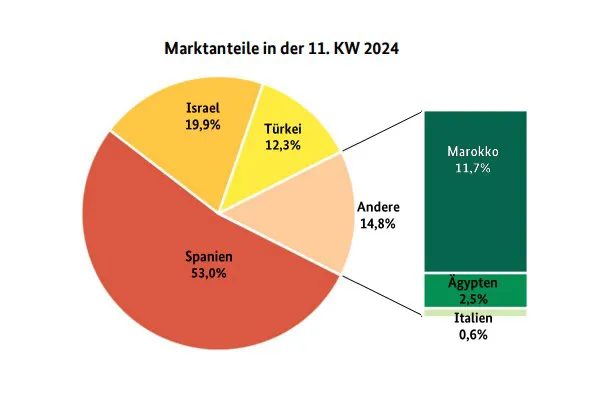The end of the European mandarin campaign has come into view: Markets were still sufficiently stocked, and the quality of the offerings continued to convince, but demand had noticeably decreased. With spring-like temperatures, storage options had certainly become limited. Spanish deliveries, especially Nadorcott and Tango Gold, remained the basis of the offer according to BLE, with the latter becoming significantly less. Orri from Spain increasingly displaced their Israeli counterparts and impressed with good peelability and great aroma. Turkish and Moroccan shipments only played a supplementary role and were already leaving some markets. Imports from Egypt and Italy were only available in small quantities in Hamburg and Munich. The quotations mostly remained at the level of the previous week but tended locally to decrease.

Apples
The assortment had not changed significantly: Domestic batches still dominated, followed by Italian and French lots. Interest was generally friendly, intensifying towards the weekend.
Pears
The presence of South African and Argentine imports expanded. Turkish and Dutch deliveries played a slightly larger role in places. The South African batches often had to deal with price reductions, as their relevance had noticeably increased.
Grapes
South African shipments dominated the scene. Imports from Peru, India, and Namibia followed but ultimately did not go beyond a supplementary character. Especially the arrivals from India had noticeably increased; with Sonaka even a new variety was ready.
Oranges
The season was heading into the final stretch: Interest was waning and the qualitative properties of the fruits could no longer fully convince. Spanish and Egyptian oranges predominated in a diverse assortment, with Turkish, Italian, and Greek deliveries complementing.
Lemons
Spanish Primofiori were available almost monopolistically in some places, occasionally complemented by Turkish Enterdonato and Lama. In Frankfurt, a few Greek batches were also accessible.
Bananas
A calm trade was observed. Traders in Munich and Berlin did not see the need to change the prices. Elsewhere, occasional price increases were recorded, as storage options had improved.
Cauliflower
Italian and French supplies dominated the scene, supplemented by Spanish and a few Belgian deliveries. The Italian offers sometimes suffered from inconsistent quality, which is why they had to be offered within a wide price range.
Lettuce
Iceberg lettuce came exclusively from Spain. Demand could not always be fully met, as deliveries had become limited: Water scarcity in the Spanish growing areas and delivery programs to the retail trade significantly limited the shipments.
Cucumbers
Dutch cucumbers had displaced the Spanish ones from the top of the assortment. Belgian and domestic lots gained significantly in importance. Even though the Spanish season was coming to an end, the batches could still convince in terms of quality.
Tomatoes
A wide-ranging assortment was available, which, however, had become limited overall. Especially the Moroccan imports had noticeably lost relevance, which is why they had indeed become more expensive. Yet, the availability of Spanish fruits also apparently decreased.
Bell peppers
Spanish offers formed the basis of the assortment, with Turkish imports supplementing it. From Morocco, only red pointed peppers were available. The Dutch and Belgian season started with extremely low quantities. Spanish products were not always convincing in terms of their quality.
Source: BLE
